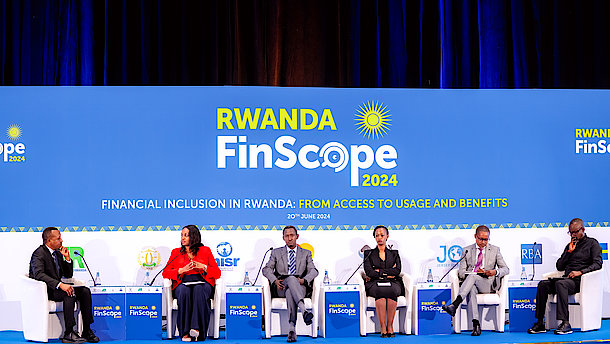
Today, the Ministry of Finance and Economic Planning (MINECOFIN), in collaboration with Access to Finance Rwanda (AFR), the National Bank of Rwanda (BNR), and the National Institute of Statistics of Rwanda (NISR), unveiled the results of the Rwanda FinScope 2024 Survey. This comprehensive report evaluates the changes in access to and utilization of financial services since the last FinScope report in 2020. It assesses the impact of various developments within the financial sector and the economy on the levels of financial inclusion in Rwanda.
The report findings reveal that Rwanda has made impressive progress in financial inclusion in 2024, with 96% or 7.8 million Rwandan adults now being financially included, up from 93% in 2020. This places the country close to achieving the universal access target of 100%. Only 4% of Rwandan adults are currently not utilizing formal or informal financial products or services, rendering them financially excluded.
Yusuf Murangwa, the Minister of Finance and Economic Planning, commented on the report, stating: “The findings of this report are in line with our national priorities as outlined in the Financial Sector Development Strategic Plan (2018-2024). They will guide our policy decisions and efforts to foster financial inclusion and economic development in Rwanda. This survey coincides with the conclusion of the National Strategy for Transformation (NST1) and the Financial Sector Development Strategic Plan, providing valuable insights to shape the next generation of mid-term development strategies in Rwanda.”
The survey highlights a significant increase in formal financial inclusion, rising from 77% (5.4 million) in 2020 to 92% (7.5 million) in 2024, surpassing the targeted 90% mark for this year. Notably, the adoption and usage of formal non-bank products and services have also surged to 92% (7.5 million) in 2024 from 75% (5.3 million) in 2020, driven primarily by the uptake of mobile money services, insurance, and pension products.
In 2024, approximately 86% (6.9 million) of Rwandans utilized mobile money, with the number of adults holding registered mobile money accounts increasing from 60% (4.3 million) in 2020 to 77% (5.8 million) in 2024. The survey indicates significant progress towards a cashless economy in Rwanda, propelled by the widespread adoption of mobile financial services. Overall, the data reveals a substantial growth in the use of digital financial services, climbing from 30% (2.1 million) to 73% (5.9 million) in 2024.
Furthermore, the survey shows a notable uptick in the utilization of insurance products, increasing from 17% (1.2 million) in 2020 to 27% (2.1 million) in 2024, largely due to the rising popularity of microinsurance offerings such as those under the National Agriculture Insurance Scheme (“Tekana Urishingiwe Muhinzi Mworozi”). Additionally, the adoption of pension products has risen to 26% (2.1 million) from 7% (504,000) in 2020, primarily driven by the “Ejo Heza” long-term saving scheme.
However, the percentage of banked individuals remained consistent at 22% (1.6 million) in both 2020 and 2024, while the number of credit-active consumers declined by 13 percentage points, with approximately 63% (5.1 million) of adults borrowing in the past 12 months, down from 76% (5.4 million) in 2020.
The Rwanda FinScope Survey has been conducted every four years since 2008 through the Financial Sector Partnership. While previous FinScope surveys aimed to provide crucial information to guide policy interventions and financial service providers in expanding the reach and depth of the Rwandan financial system, the 2024 survey marks a shift from Financial Inclusion to Inclusive Finance. Inclusive finance is achieved when financial services enable various beneficiaries, such as households, young entrepreneurs, and MSMEs, to access a tailored set of products and services that meet their specific needs. (End)
